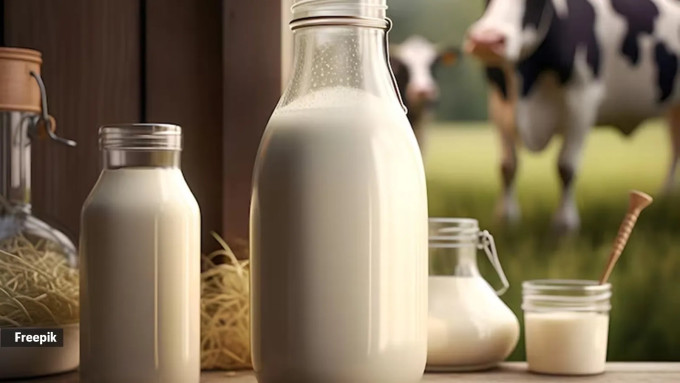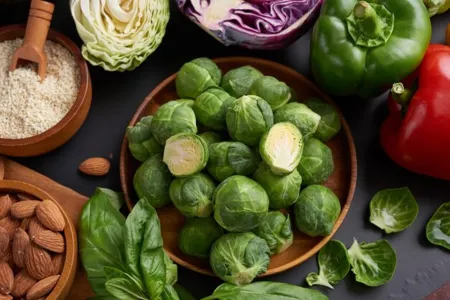Does broccoli have double the vitamin C of oranges, match milk’s calcium, and is more easily absorbed by our bodies?
The new favorite in Indian households is broccoli. While it does provide a nutritious fare, we wanted to understand if the cruciferous vegetable does contain twice as much vitamin C as oranges, match the calcium content of milk, and is more readily absorbed by our bodies, as claimed by nutritionist Pooja Palriwala in a post on Instagram.
“Broccoli boasts twice the vitamin C content compared to oranges and matches milk’s calcium levels. Additionally, its nutrients are more readily absorbed by the body. This cruciferous vegetable stands out for its nutritional prowess, offering a powerhouse of essential vitamins and minerals that contribute to overall health and well-being. Incorporating broccoli into your diet can provide a significant boost to your nutrient intake,” said Palriwala.

While the statement contains some elements of truth, it oversimplifies the comparison between broccoli and oranges, as well as broccoli and milk, said clinical dietitian Garima Goyal. Let’s break down the claims and examine the scientific evidence behind them.
Broccoli’s vitamin C content compared to oranges
Oranges are renowned for being a primary source of vitamin C, a water-soluble antioxidant essential for collagen synthesis, immune function, and antioxidant defense. On the other hand, broccoli, a cruciferous vegetable, also contains a noteworthy amount of vitamin C.
The comparison of vitamin C content is nuanced and depends on the specific quantities and varieties considered. “For instance, 100 grams of raw broccoli provides around 89 milligrams of vitamin C, while the same amount of raw oranges offers approximately 53 milligrams. However, asserting that broccoli has double the vitamin C of oranges oversimplifies the dynamic nutritional profile of these foods and may not hold across all contexts,” said Goyal.
Broccoli matching milk’s calcium content
Calcium is vital for maintaining bone health, nerve transmission, and blood clotting. Milk is a well-known source of highly bioavailable calcium, meaning the body can efficiently absorb and utilise it.
“Broccoli does contain calcium, but it might not match the calcium content found in milk. Approximately 100 grams of broccoli provides around 47 milligrams of calcium, while 100 milliliters of milk typically contain about 120 milligrams. The bioavailability of calcium in broccoli is influenced by factors such as the presence of oxalates, which can form insoluble complexes with calcium and impact its absorption. Therefore, while broccoli contributes to calcium intake, it is not an identical substitute for the calcium provided by milk,” said Goyal.
Broccoli’s absorption in the body
The claim that broccoli is more easily absorbed by our bodies requires consideration of various factors influencing nutrient absorption. Broccoli is rich in dietary fibre, which plays a significant role in digestion but may also affect nutrient absorption dynamics.
Fibre can have a slowing effect on the absorption of certain nutrients, but it also imparts numerous health benefits, including improved digestive health and regulation of blood sugar levels. “The overall bioavailability of nutrients, including those in broccoli, depends on factors such as the individual’s digestive physiology, the specific nutrients involved, and the food matrix,” said Goyal.
Certainly, let’s explore the factors influencing the absorption of calcium and vitamin C in the context of broccoli:
Factors influencing calcium absorption in broccoli
Broccoli contains oxalates, compounds that can form insoluble complexes with calcium, potentially reducing its absorption. “The impact of oxalates on calcium absorption depends on the overall calcium-to-oxalate ratio in the diet,” said Goyal.
The balance between calcium and phosphorus in the diet influences the overall bioavailability of calcium. Goyal mentioned that broccoli‘s calcium content should be considered in conjunction with other dietary factors to optimise calcium absorption.
 Do you have milk? (Source: Freepik)
Do you have milk? (Source: Freepik)
Vitamin D plays a crucial role in calcium absorption. “Adequate exposure to sunlight or sufficient dietary vitamin D enhances the absorption of calcium, reinforcing the importance of a well-rounded diet,” said Goyal.
Calcium absorption can vary among individuals based on factors like age, sex, and health status. “Some individuals may absorb calcium from broccoli more effectively than others, depending on their unique physiological characteristics,” said Goyal.
The nutritional content of foods is multifaceted, influenced by factors such as serving sizes, preparation methods, and the specific varieties of each item.
View this post on Instagram
A post shared by Pooja Palriwala (@nutritionistpoojapalriwala)
Goyal shared that the absorption of calcium and vitamin C from broccoli is influenced by a combination of factors, including its oxalates content, the calcium-to-phosphorus ratio, the presence of vitamin D, individual variability, the bioavailability of vitamin C, variability in vitamin C content, nutrient synergy, and cooking methods. “A balanced and varied diet, along with mindful food preparation, contributes to optimising the absorption of these essential nutrients from broccoli. Additionally, individual dietary needs and preferences should be considered when determining the most suitable sources of nutrients for optimal health,” said Goyal.
Disclaimer: The copyright of this article belongs to the original author. Reposting this article is solely for the purpose of information dissemination and does not constitute any investment advice. If there is any infringement, please contact us immediately. We will make corrections or deletions as necessary. Thank you.





